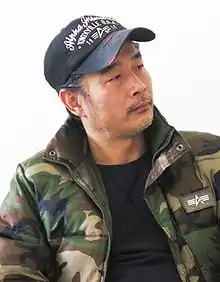Toshiya Masuda
Toshinari Masuda (増田 俊也 Masuda Toshinari, November 8, 1966), better known as Toshiya Masuda, is a Japanese novelist, essayist and martial arts historian.

Biography
Born in the Aichi prefecture, Inoue studied at Hokkaido University, where he joined the judo team and competed in the prestigious Nanatei Judo league. In 1989, he graduated as a journalist, joining the Chunichi Shimbun in its sports section. His first novel, Shatun Higuma no Mori, earned a special mention in the Kono Mystery ga Sugoi! ceremony in 2006, making him a name in the ecological movements for its environmentalist themes.
In 2012, he published the non-fiction novel Kimura Masahiko wa Naze Rikidōzan o Korosa Nakatta no Ka (Why Masahiko Kimura Didn't Kill Rikidozan), covering the lives of Masahiko Kimura and Rikidozan and their relationship as well as the latter's death. The work won both the Soichi Oya Non-Fiction Prize and the Shincho Document Prize.[1] Masuda followed the next year with his own fictionalized autobiography, Nanatei Judo Ki, being nominated as a finalist for Kadokawa Shoten's Futaro Yamada Prize. In 2014, he published an essay originally written in 2009, VTJ Zenja no Nakai Yuki, about Yuki Nakai's mixed martial arts career.
His first three works have been adapted to manga by Shueisha, Futabasha and Shogakukan editorials.
Prizes
- 2012 Soichi Oya Non-Fiction Prize --- Kimura Masahiko wa Naze Rikidōzan o Korosa Nakatta no Ka
- 2012 Shincho Document Prize --- Kimura Masahiko wa Naze Rikidōzan o Korosa Nakatta no Ka'
- 2012 Seiun Award --- Doseijin Shurai as part of the NOVA anthology
- 2014 Nihon SF Taisho Award --- Doseijin Shurai as part of the NOVA anthology
Works
Fiction
- Shatun Higuma no Mori (2006)
- Doseijin Shurai (2012) - part of the 7º NOVA anthology
Non-fiction
- Kimura Masahiko wa Naze Rikidōzan o Korosa Nakatta no Ka (2012)
- Nanatei Judo Ki (2013)
Essays
- VTJ Zenja no Nakai Yuki (2014)
- Honto no Tsuyo sa to Wa Nani Ka (2016) - co-authored with Yuki Nakai
References
- "大宅賞作家が全身全霊で奏でた人間賛歌 『VTJ前夜の中井祐樹』 (増田俊也 著) - 著者は語る - 週刊文春WEB". Archived from the original on 2015-05-02.